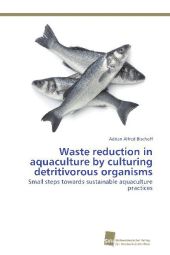 Neuerscheinungen 2012Stand: 2020-01-07 |
Schnellsuche
ISBN/Stichwort/Autor
|
Herderstraße 10
10625 Berlin
Tel.: 030 315 714 16
Fax 030 315 714 14
info@buchspektrum.de |

Adrian Alfred Bischoff
Waste reduction in aquaculture by culturing detritivorous organisms
Small steps towards sustainable aquaculture practices
2012. 172 S. 220 mm
Verlag/Jahr: SÜDWESTDEUTSCHER VERLAG FÜR HOCHSCHULSCHRIFTEN 2012
ISBN: 3-8381-3274-2 (3838132742)
Neue ISBN: 978-3-8381-3274-7 (9783838132747)
Preis und Lieferzeit: Bitte klicken
Conventional aquaculture production systems have all in common that they release feed nutrients either in dissolved or particulate form. The efficient removal of suspended solids is a key factor for the successful operation of recirculating aquaculture systems. During the experiments of this work solid waste from modern recirculating systems for marine fish were used for the cultivation of detritivorous organisms. In an experimental integrated recirculating system, fish was cultured for a period of 684 days. During the complete growth period of the fish, polychaete worms were cultivated as exclusive consumer of the excreted particulate waste. In the earlier part of the experiments a nutritional under-supply of the worms was noticeable. With increasing fish biomass the nutrient and therefore the energy supply of the worms could be met to enable the worms to grow and finally to reproduce. Till the end of the experimental period a self-sustaining worm population up to the fourth generation could be achieved. During further experiments the second organism Crangon crangon also revealed its potential as detritivorous organisms for integrated aquaculture.
Dr. Adrian A. Bischoff was born in 1973 in Werneck, Germany. After finishing his studies of fisheries biology, with focus on Aquaculture, at the University of Kiel, he did his PhD at the Institute of Marine Sciences at Kiel. Currently he is a project manager at the professorship for Aquaculture and Sea-Ranching at the University of Rostock.


